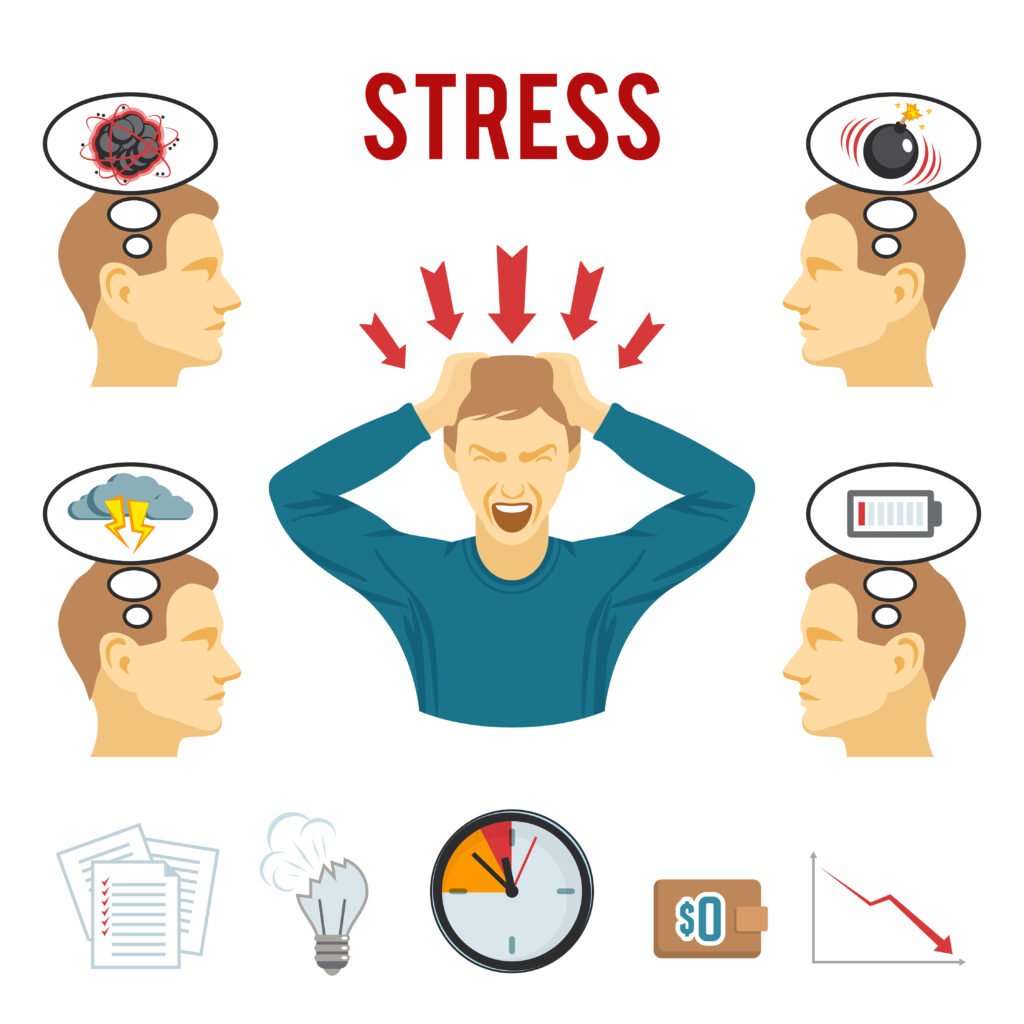stress can take a heavy toll on your mind, body, and behavior. But by identifying the stressors in your life, and distinguishing eustress from distress, you can reduce its harmful
what is stress ?

Stress is a natural and adaptive response that the nervous system experiences when confronted with challenges or demands. When you feel like there’s danger, whether it’s actually happening or just in your mind, your body quickly gears up to protect itself.
This fast and automatic response is the body’s way of preparing to confront or avoid a threat, known as the “fight or flight” response. When someone feels like a situation is stressful, the body releases stress hormones, such as cortisol and adrenaline, triggering physiological changes.
These changes include increased heart rate, heightened alertness, and a burst of energy, which can be helpful in dealing with immediate threats.
Stress can have other positive aspects, referred to as ‘eustress.’ It can help you step up in situations, like staying alert during a work presentation, focusing better in a crucial game, or motivating you to study for an exam instead of watching TV.
However, chronic or prolonged exposure to stress without adequate relief can lead to negative effects on physical and mental health. If you feel stressed a lot and it’s too much, it’s time to do something about it. You can protect yourself and feel better by learning the signs of stress and taking steps to reduce its impact on how you think and feel. but before learning the signs we need to know:
how stress works ?

When you sense danger or feel threatened, your body goes into a stress mode. This means your nervous system releases stress hormones like adrenaline and cortisol ,which rouse the body for emergency action.
It makes your heart beat faster, muscles get tight, blood pressure rises and you breathe faster. These physical ch blood pressure risanges increase your strength, stamina , speed up your reaction time and enhance your focus_preparing your body for quick reaction.
How stress can make you sick ?

Your body isn’t good at distinguishing between emotional and physical threats. If you’re super stressed over an argument with someone, a work deadline, or a mountain of bills, your nervous system can react strongly similar to a life-or-death situation . I realize this is difficult to hear but it is the truth.
If you often feel stressed, which is common in today’s fast-paced world, your body might be in a constant state of stress. This ongoing stress can lead to serious health problems, affecting nearly every part of your body.
It can make your immune system weaker, mess with your digestion and reproduction, raise the risk of heart issues, and speed up the aging process. Chronic stress can even change your brain, making you more likely to face anxiety, depression, and other mental health challenges.
Health problems caused or exacerbated by stress :

- Weakened Immune System: Chronic stress can suppress the immune system, making the body more susceptible to infections and illnesses.
- Digestive Issues: Stress can contribute to digestive problems such as indigestion, acid reflux, and irritable bowel syndrome (IBS).
- Cardiovascular Conditions: Prolonged stress is associated with an increased risk of heart problems, including hypertension and heart disease.
- Respiratory Disorders: Stress may worsen conditions like asthma and chronic obstructive pulmonary disease (COPD).
- Muscle Tension and Pain: Stress often leads to muscle tension, which can result in headaches, migraines, and overall body pain.
- Reproductive Problems: For both men and women, chronic stress can affect reproductive health, leading to issues such as infertility or menstrual irregularities.
- Sleep Disorders: Stress can interfere with sleep, contributing to insomnia and other sleep disturbances.
- Mental Health Conditions: Chronic stress is linked to mental health problems, including anxiety disorders, depression, and increased risk of developing other psychiatric disorders.
- Skin Conditions: Stress can exacerbate or trigger skin conditions like eczema, psoriasis, and acne.
- Weight Gain: Stress may contribute to unhealthy eating habits and weight gain, which in turn can lead to obesity and related health issues.
Signs and symptoms of chronic stress
- Feeling Anxious: When you’re stressed, you might feel worried or anxious about things more than usual.
- Low Energy: Stress can make you feel tired and low on energy, even if you didn’t do much.Trouble Sleeping: Stress can mess with your sleep, making it hard to fall asleep or stay asleep.
- Headaches or Body Pain: Stress often causes headaches, muscle tension, or pain in different parts of your body.
- Upset Stomach: You might feel butterflies in your stomach, nausea, or other digestive issues when stressed.
- Forgetfulness: Stress can make it difficult to focus and remember things.
- Changes in Appetite: Stress might make you eat more or less than usual.
- Mood Swings: You might feel irritable, moody, or easily upset when stressed.
- Increased Heart Rate: Stress can make your heart beat faster, even when you’re not doing anything active.
- Breathing Changes: You might breathe faster or feel like it’s harder to take a deep breath when stressed.
- Sweating: Stress can make you sweat more than usual, even if it’s not hot.
- Feeling Overwhelmed: You might feel like there’s too much to handle and become overwhelmed by stress.
- Clenched Jaw or Teeth Grinding: Stress can cause jaw tension, and you might catch yourself grinding your teeth.
- Changes in Skin: Stress might lead to changes in your skin, like breakouts or increased sensitivity.
- Tension in Neck and Shoulders: Stress often causes tightness and tension in the muscles of your neck and shoulders.
- Nervous Habits: You might develop nervous habits like nail-biting, fidgeting, or pacing when stressed.
- Dizziness: Stress can make you feel lightheaded or dizzy at times.
- Difficulty Concentrating: It might be hard to concentrate or stay focused on tasks when you’re stressed.
- Social Withdrawal: You might feel like avoiding social situations or withdrawing from others when stressed.
- Increased Irritability: Stress can make you more easily irritated or annoyed by small things.
It’s important to recognize these signs and take steps to manage stress for better overall well-being.
Causes of stress

Stress can be caused by various factors, and what triggers stress can vary from person to person. some common causes of stress:
- Work Pressure: Demanding workloads, tight deadlines, or job insecurity can lead to work-related stress.
- Personal Relationships: Conflicts or challenges in relationships with family, friends, or partners can be a source of stress.
- Financial Issues: Money problems, such as debt, financial instability, or unexpected expenses, can contribute to stress.
- Major Life Changes: Events like moving, starting a new job, getting married, or going through a divorce can be stressful.
- Health Concerns: Dealing with health issues, whether personal or for a loved one, can cause significant stress.
- Daily Hassles: Everyday challenges like traffic, long commutes, or household responsibilities can contribute to stress.
- Uncertainty or Lack of Control: Feeling uncertain about the future or having a lack of control over situations can be stressful.
- Environmental Factors: Living in a noisy or polluted environment can.
- Academic Pressure: Students may experience stress due to exams, academic performance, or competition.
- Social Expectations: Trying to meet societal expectations or comparing oneself to others can lead to stress.




